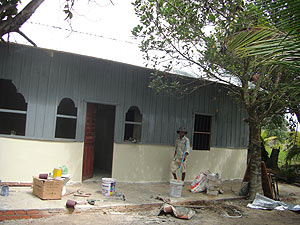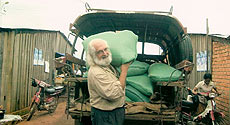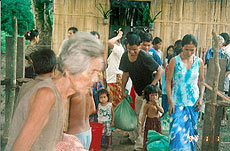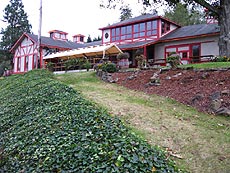Countries such as Myanmar, North Korea, Vietnam and Cambodia were sharply criticized, while Indonesia and Thailand received generally high marks.
The survey (www.state.gov/g/drl/rls/hrrpt/2008/index.htm), a worldwide roundup required by Congress, is compiled from reports by U.S. diplomats in each country.
CAMBODIA: The State Department said the government's record "remained poor" during 2008, and it criticized extrajudicial killings by security forces, arbitrary arrests, prolonged pretrial detentions, a weak judiciary and denials of the right to a fair trial.
Seizures of private land for government and commercial projects has caused extensive unrest in Cambodia, especially in the capital Phnom Penh, and the U.S. report cited land issues as "a continuing problem."
"Corruption was endemic," the report said.
The commercial sex trade continued to ensnare women and children, the report found. Cambodia has long been a regional destination for child-sex tourists, and the report cited "increasing reports that Asian men traveled to the country to have sex with underage virgin girls."
HONG KONG: The U.S. report found that the Hong Kong government "generally respected" the rights of its citizens in 2008 and passed new measures to protect women against violence, including marital rape.
One of the persistent "core issues" of concern for the State Department, however, is the semi-autonomous Chinese territory's Basic Law, which the report said "limits the ability of citizens to participate in and change their government."
"The legislature was limited in its power to introduce or amend legislation," the survey said, "and could not approve executive appointments."
INDONESIA: Secretary of State Hillary Rodham Clinton detoured through Indonesia last week during a trip to Asia - her first overseas mission for President Barack Obama - and she said the country had undergone "a great transformation" since the Asian financial crisis 10 years ago.
The State Department report, on balance, also was complimentary of Indonesia, referring to "significant measures to advance human rights and consolidate democracy."
"Indonesia deserves credit - really remarkable," said Zachary Abuza, a professor of political science at Simmons College in Boston and a widely recognized expert on Southeast Asia. "The story of this year's election is that there is no story: parties are out doing things parties do, candidates are campaigning, and there is little political violence. Democracy, albeit imperfect, is taking root."
But Abuza added that "the usual suspects deserve their comeuppance" in the report - the judiciary, well-connected business interests and the military.
"In practice," the State Department said, "the judiciary remained susceptible to influence from outside parties, including business interests, politicians, and the military."
MACAO: Incidents of official corruption, human trafficking and some limits on political activities were the principal blots - and largely minor ones, according to the U.S. report - on the record of the semi-autonomous Chinese territory, which the report said "generally respected the human rights of its citizens."
But the survey cited a number of cases of Hong Kong lawmakers, politicians and activists being denied entry to Macao, presumably for their opposition to the proposed Article 23, a broadly worded amendment to Hong Kong's Basic Law that prohibits subversion against the Beijing government. Macao's largely pro-Beijing Legislature passed a version of the measure on Wednesday.
MALAYSIA: The country's national elections in March were held in "a generally transparent manner," the U.S. report said, and the central government "generally respected the human rights of its citizens."
But the report also found worrisome and chronic problems, including "credible allegations of immigration officials' involvement in the trafficking of Burmese refugees" as well as governmental preferences given to ethnic Malays. Malaysia also continued to restrict some basic freedoms, including press, speech and religion, the State Department said.
In practice, the report found, "the country does not permit Muslims, born into Islam, to convert to another religion," and civil courts have not intervened in these apostasy cases that have come before courts enforcing Shariah, or Islamic law.
"The report completely skipped over the huge number of contentious cases regarding apostasy," Abuza said. "It mentioned the one case of Lina Joy, but none of the others. Communal tensions are as high as they've been in years."
MYANMAR: The report on Myanmar, which the State Department survey refers to as Burma, called the ruling junta "highly authoritarian" and said military officers "wielded the ultimate authority at each level of government."
The U.S. criticisms were harsh and wide-ranging: extrajudicial killings; official rape, torture and disappearances; the abuse, harassment and detention of political activists; the delay of international aid to cyclone victims; use of children as soldiers and forced laborers for the military; the trafficking of women and girls; and restrictions on speech, assembly and worship.
"Clearly, the path we have taken in imposing sanctions hasn't influenced the Burmese junta," Clinton said last week. "Reaching out and trying to engage them hasn't worked either."
Two senior opposition leaders - the Nobel Peace Prize laureate Aung San Suu Kyi and Tin Oo, a longtime political activist - remained under house arrest. Severe restrictions on aid workers and NGOs remained in place, despite a crippling cyclone in May that left some 130,000 dead and missing. The State Department assailed the junta for delaying the distribution of international humanitarian aid to citizens and areas affected by the storm.
NORTH KOREA: "A dictatorship under the absolute rule of Kim Jong Il" is how the State Department described the North Korean regime.
The report on 2008 reiterates the regime's many known abuses, including extrajudicial killings, arbitrary detention, torture of prisoners through the use of electric shocks, public nakedness and extreme stress positions. "Pregnant female prisoners underwent forced abortions in some cases," the survey said, "and in other cases babies were killed upon birth in prisons."
The regime's nearly absolute control of information meant Internet access was limited to high-ranking officials and select university students, the report stated, noting that Web access was routed by phone lines through China and a local connection linked to a German server.
SINGAPORE: The U.S. report assailed the government's use of its "broad powers to limit citizens' rights and to handicap political opposition," and also criticized the practice of preventive detention, executive influence over the judiciary and abridgements on freedom of speech and the press.
"Government intimidation and pressure to conform resulted in self-censorship among journalists," the report found. "However, there was a moderate level of debate in newspapers and on the Internet on some public issues such as rising income inequality and whether to repeal a statute that bans homosexual activity."
THAILAND: It was a fractious year for Thailand, with anti-government protests and court rulings leading to substantial political changes. Mass protests at one point shut down both the airports in Bangkok for eight days, causing a serious blow to the economy. The political street theater calmed in December, with the selection of a new prime minister, Abhisit Vejjajiva.
The U.S. report found that Thailand "avoided unconstitutional disruptions in governance, and the government's respect for human rights remained unchanged."
"In all, the State Department seems so pleased that Abhisit is in power and that there is the potential for political stability that it's willing to gloss over much of the undemocratic means that got him there," Abuza said.
"The report also glosses over the back-room machinations of the monarchy and the total politicization of the judiciary," he added. "It also generally ignores the fact that under the 2007 Constitution, half the senators are appointed, mainly by the crown."
The report tied numerous human rights abuses to a separatist insurgency in southern Thailand.
"The human rights community has documented more than 34 extrajudicial killings in the south, far above the State Department's reporting," Abuza said.
VIETNAM: The summary of the State Department report on Vietnam was sharp and to the point: "The government's human rights record remained unsatisfactory."
"Political opposition movements were prohibited," the report stated. "The government continued to crack down on dissent, arresting political activists and causing several dissidents to flee the country. Police sometimes abused suspects during arrest, detention, and interrogation. Corruption was a significant problem in the police force."
State controls were found to have been tightened on the press and freedom of speech; foreign human rights groups were barred from the country; and human trafficking, violence against women and Internet firewalls (particularly against sites affiliated with the Catholic Church) remained areas of concern to the United States.
"The country was a significant source for trafficking in persons," the report stated, and there were reports of women being sent not just to other countries in the region but also to Britain, Eastern Europe, and the United States. "Children were trafficked for the purpose of prostitution, both within the country and to foreign destinations."























